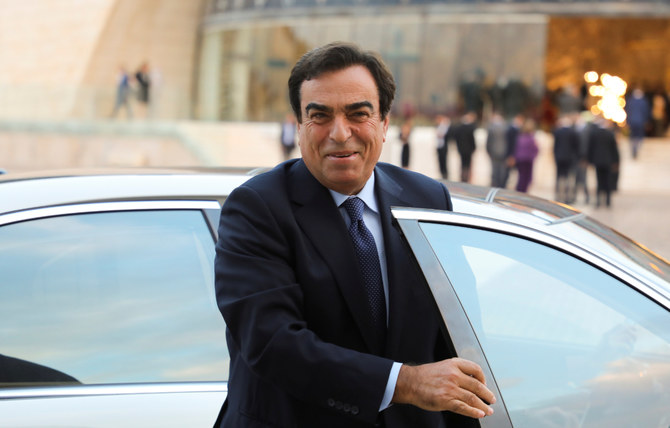BEIRUT: Pressure is mounting on Lebanese leaders to remove a Cabinet minister whose comments on the war in Yemen have triggered a diplomatic row with Saudi Arabia, even as the minister at the center of the crisis said that resigning from the government was not an option.
The Kingdom, the UAE, Kuwait and Bahrain have recalled their ambassadors from Lebanon, while also instructing Lebanon’s envoys to leave. The UAE has banned its citizens from traveling to Lebanon.
The decisions follow remarks that Information Minister George Kordahi gave in an interview that was recorded before his appointment, saying the Iran-backed Houthis were defending themselves and that the war in Yemen should stop, with a video of the interview emerging last week.
In a televised speech on Sunday, amid the deepening crisis, Kordahi addressed those who had been urging him to quit. “Resigning from the government is not an option,” he said.
Lebanon has been calling US and French officials, asking them to intervene and help them find a way out of the crisis caused by his comments, which go against the country’s official position on the Yemen conflict.
King Salman called Kuwait's Emir Sheikh Nawaf Al-Ahmed Al-Jaber Al-Sabah on Sunday to express his appreciation for the measures that Kuwait had taken on Kordahi’s statements, reflecting the solidarity of the Gulf Cooperation Council countries, according to Saudi Arabia’s embassy in Lebanon.
Al-Sabah said that “the measures of his country reflect the unity of GCC countries and the depth of relations among their peoples,” the embassy added.
King Salman also called King Hamad of Bahrain and “expressed his gratitude for the measures Bahrain has taken regarding the statements, reflecting Saudi-Bahraini solidarity and unity of the GCC countries.”
He reiterated “the depth of relations between the two brotherly countries and the solidarity among GCC countries.”
Lebanon’s ambassador to Saudi Arabia, Fawzi Kabbara, announced on Sunday that he had returned to Beirut. He said that “restoring Lebanese-Saudi ties would be possible if Lebanon agrees to the conditions.”
Lebanon’s Maronite Patriarch Bechara Al-Rahi in his Sunday sermon called for “decisive action,” suggesting that he wanted Kordahi to resign.
He said: “We are hoping that President Michel Aoun, Prime Minister Najib Mikati and everyone else involved in the case will take decisive action to save Lebanese relations with the Gulf. The most important achievement that political forces can make is not to be dragged into the game of states, especially during this critical phase in the region.”
He also said Lebanon had opted for “partnership” to establish peace, moderation and neutrality, and the state of law that was protected by a “just and fair” judiciary.
“The crisis between Lebanon and Saudi Arabia in particular, and the Gulf countries in general, has multiple and accumulating causes and harms the interests of Lebanon and the Lebanese,” he warned.
Mikati is in Glasgow for the COP26.
According to sources, he is expected to hold “several international and Arab meetings on Monday and Tuesday to discuss the current crisis between Lebanon and Gulf countries” on the sidelines of the summit.
The Lebanese-Saudi Business Council condemned Kordahi’s statements as well as those from former minister Charbel Wehbe and other officials they said had harmed the country’s relations with its Arab neighbors, “especially ones who have stood beside us during the difficult times – mainly Saudi Arabia.”
It urged that the necessary measures be taken to remove Kordahi who, it said, had caused “an unprecedented rift” with Saudi Arabia and Gulf countries, because of “irresponsible statements over which he did not bother to apologize or resign” to maintain Lebanon’s relations with Gulf countries and protect national interests.
“Things should go back to the way they were and Lebanon should be brought back to its Arab and Gulf environment to protect the diaspora in Saudi Arabia and Gulf countries, and the interests of farmers, industrialists, exporters, traders, contractors and those who need today, more than ever before, to protect their interests against absurdity and deterioration,” it said.
The Saudi ambassador to Lebanon, Walid Bukhari, quoted Gebran Khalil Gebran on Sunday in a tweet: “A sinner would not commit a sin without a hidden will. Gebran Khalil Gebran uttered those words, and they were heard by the whole world. He is the master of words.” He left Lebanon on Saturday.
Former MP Mustafa Alloush, who is vice president of the Future Movement, said the situation would have been different had Kordahi resigned two days after what had happened. “But today, I am certain that harming Lebanon’s relations with Saudi Arabia was intentional. Hezbollah is continuing its project by increasing hostility with Arab states," he told Arab News.
“But the whole case has to do with a long history of anti-Saudi statements and positions by Kordahi, former minister Wehbe and MP Gebran Bassil, along with the lack of addressing the Captagon-smuggling issue from Lebanon into the Kingdom, and Hezbollah’s continuing insults to Saudi Arabia and threats to its security.
“Whether Kordahi resigns now or not, this is no longer relevant. The Lebanese government has become a hostage and the proof is that the positions of Mikati and the Lebanese Foreign Ministry were not decisive nor firm. Mikati had to be firm and order the removal of Kordahi and threaten to dissolve the government.”
The Foreign Ministry reiterated in a statement on Sunday that Lebanon’s “great concern (was) to have the best relations with its Gulf and Arab brothers."
The ministry also referenced the position of Oman’s Foreign Ministry calling on everyone to “show restraint, avoid escalation and address the dispute through dialogue and understanding to preserve the supreme interests of states and peoples and maintain stability, security and cooperation, on the basis of mutual respect and non-interference in internal affairs.”
A committee formed at Mikati’s request to resolve the Kordahi crisis has so far failed to find a solution. It recommended waiting on the results of the international calls being made.


















